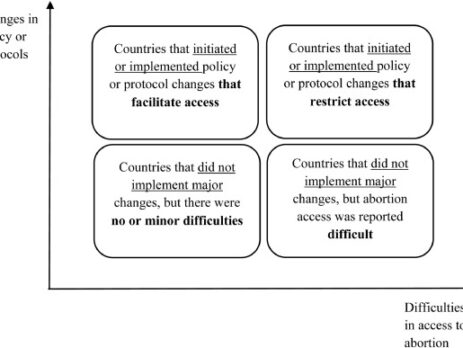We explored the challenges and policy changes affecting abortion access during the COVID-19 pandemic across the European Union and the United Kingdom. While some countries implemented measures to facilitate access, such as telemedicine and extended guidelines for early medical abortion, others restricted services or failed to consider abortion as essential healthcare. These findings underscore disparities in abortion policy and access, highlighting the broader social and political implications of healthcare policy during crises.
What was the context of our study?
The COVID-19 pandemic brought unprecedented disruption to healthcare systems worldwide. Abortion services, a time-sensitive healthcare need, faced significant challenges due to movement restrictions, overwhelmed health systems, and varying national policies. This study aimed to examine how the EU and the UK responded to these challenges in the context of abortion access, focusing on policy changes and their impact.
What did we do?
We conducted a cross-national study of abortion policies and access issues in the EU and UK during the pandemic. Using data from national legislations, policy decisions, NGO bulletins, and academic studies, we categorized countries into four groups: 1. Those facilitating abortion access. 2. Those restricting abortion access. 3. Those with no changes but relatively stable access. 4. Those with no changes and significant access challenges.
What did we find?
Our analysis revealed a spectrum of responses:
- Facilitated Access: Countries like France and the UK used telemedicine and extended gestational limits for EMA, allowing remote consultations and self-administration of abortion medication.
- Restricted Access: Nations like Poland and Slovakia implemented policies limiting abortion services, exacerbating pre-existing barriers.
- Stable Access with No Changes: Denmark and Sweden maintained access without major policy changes, aided by established EMA practices.
- Significant Challenges Without Changes: Countries like Malta faced acute barriers, with abortions often being unavailable or unsafe due to restrictions.
Why is this important?
The pandemic intensified existing disparities in abortion access across Europe, reflecting deeper socio-political divides. Understanding these responses provides valuable lessons for improving healthcare policies, ensuring equitable access, and safeguarding reproductive rights in future crises. For the general audience, this highlights the critical importance of policy in shaping healthcare access, especially for vulnerable populations during emergencies.
Reference
Bojovic, N., Stanisljevic, J., & Giunti, G. (2021). The impact of COVID-19 on abortion access: Insights from the European Union and the United Kingdom. Health Policy, 125(8), 841–858. https://doi.org/10.1016/j.healthpol.2021.05.005

